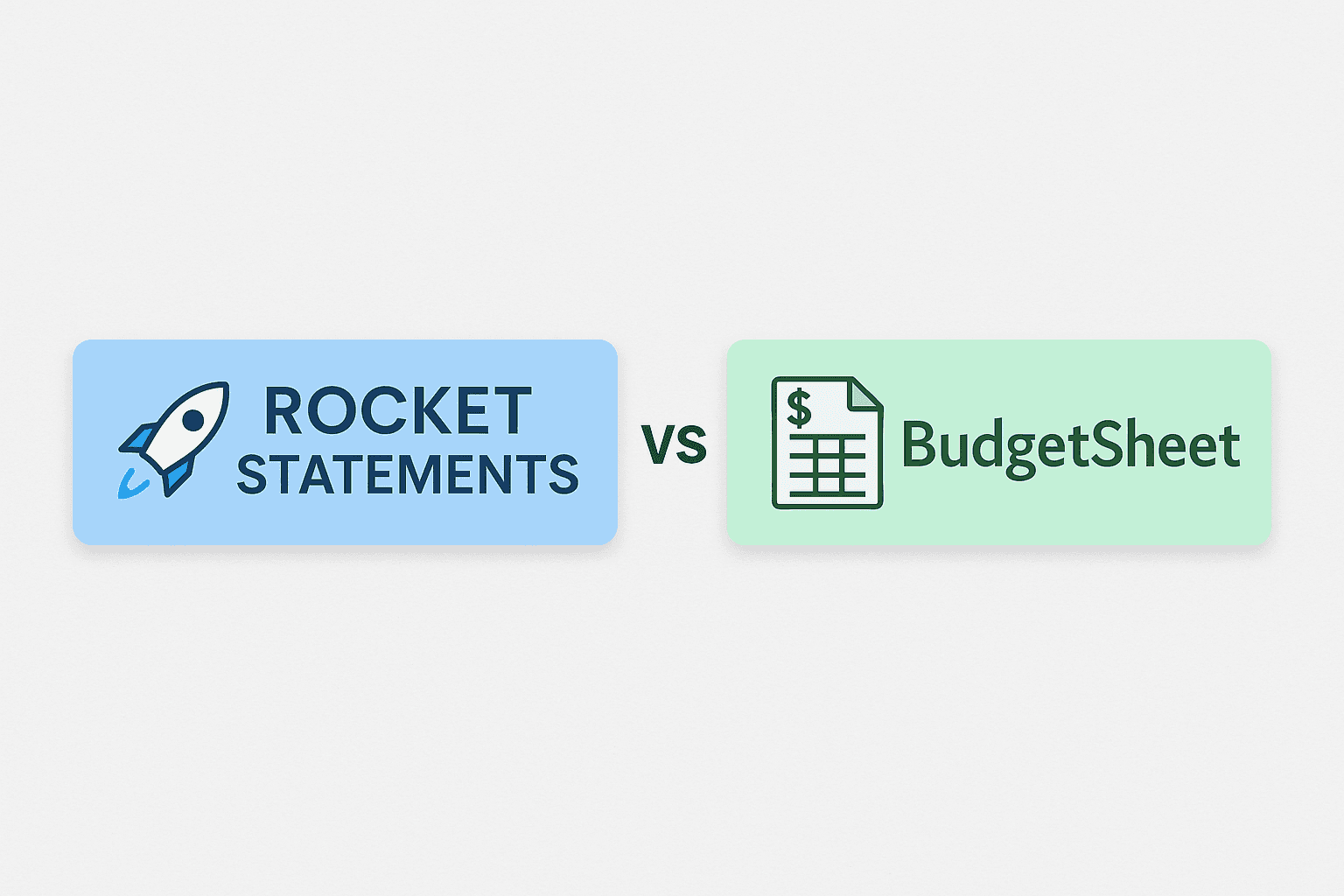If you work with bank statements regularly—whether you’re an accountant, bookkeeper, or small business owner—you know the pain of manually entering financial data. Two popular tools aim to simplify this: Rocket Statements and BudgetSheet. But which one offers the best solution for your needs?
In this guide, we’ll compare Rocket Statements vs BudgetSheet across features, ease of use, pricing, integrations, and ideal use cases so you can choose the right tool for your workflow.
What Do These Tools Do?
Rocket Statements and BudgetSheet both help users convert financial data into structured formats for easier tracking and reporting. However, they serve slightly different purposes:
- Rocket Statements focuses on converting PDF bank statements into structured CSV, XLSX, or JSON formats.
- BudgetSheet syncs live bank transaction data directly into Google Sheets using Plaid integration, allowing for real-time budgeting and expense tracking.
Feature Comparison
| Feature | Rocket Statements | BudgetSheet |
|---|---|---|
| Primary Function | PDF bank statement to spreadsheet converter | Sync live transactions to Google Sheets |
| Best For | Accountants, bookkeepers, finance professionals | Personal budgeting, freelancers |
| File Types Supported | PDF → CSV/XLSX/JSON | Live data sync only |
| Smart Data Parsing | Yes – auto-detects formats and cleans data | Not applicable (live import only) |
| Bank Coverage | Works with any bank statement (PDF format) | Depends on Plaid bank integrations |
| Security | Secure, cloud-based, no installation required | Uses Plaid for bank login security |
| Customization | Custom formatting and file naming options | Limited to what Plaid provides |
| Free Trial | 7-day free trial, no credit card required | 14-day free trial |
| Integrations | Exports to QuickBooks, Xero, Excel, Google Sheets | Google Sheets only |
When to Choose Rocket Statements
Rocket Statements is ideal if you:
- Receive PDF bank statements from clients
- Need to extract historical data from past months or years
- Want to standardize messy or scanned PDFs
- Need to transform and clean data before importing into accounting software
- Prefer flexibility with formats (CSV, XLSX, JSON)
Example use case: An accountant needs to convert 30 PDF statements from 5 different banks into a clean spreadsheet ready for reconciliation in QuickBooks. Rocket Statements does it in minutes, with smart formatting and zero manual work.
When to Choose BudgetSheet
BudgetSheet is best if you:
- Manage your own personal or freelance finances
- Want to see live bank transactions as they happen
- Prefer a Google Sheets budgeting workflow
- Only need access to current data (not PDFs)
Example use case: A freelancer wants a real-time budgeting dashboard that pulls in daily expenses from their checking account. BudgetSheet makes this simple with one-click setup and Plaid integration.
Key Differences: Rocket Statements vs BudgetSheet
| Category | Rocket Statements | BudgetSheet |
|---|---|---|
| Historical data | ✅ Supports past PDFs | ❌ No historical PDF support |
| File parsing | ✅ Auto-detects formats | ❌ Not applicable |
| Real-time sync | ❌ No live bank sync | ✅ Yes (via Plaid) |
| Ideal user | Accountants, bookkeepers | Individuals, freelancers |
| Export flexibility | ✅ CSV, Excel, JSON | ❌ Google Sheets only |
Final Verdict: Which Tool Should You Choose?
- If you're a finance professional dealing with scanned or emailed PDFs, Rocket Statements is the faster, more powerful choice for transforming messy data into clean spreadsheets.
- If you're a personal finance user looking to track your daily expenses live in Google Sheets, BudgetSheet may be the simpler and more automated route.
Start Your Free Trial Today
Whether you're cleaning up decades of bank data or building your own budgeting dashboard, the right tool makes all the difference. Try Rocket Statements risk-free for 7 days and experience how fast, secure, and accurate your financial data conversion can be.
